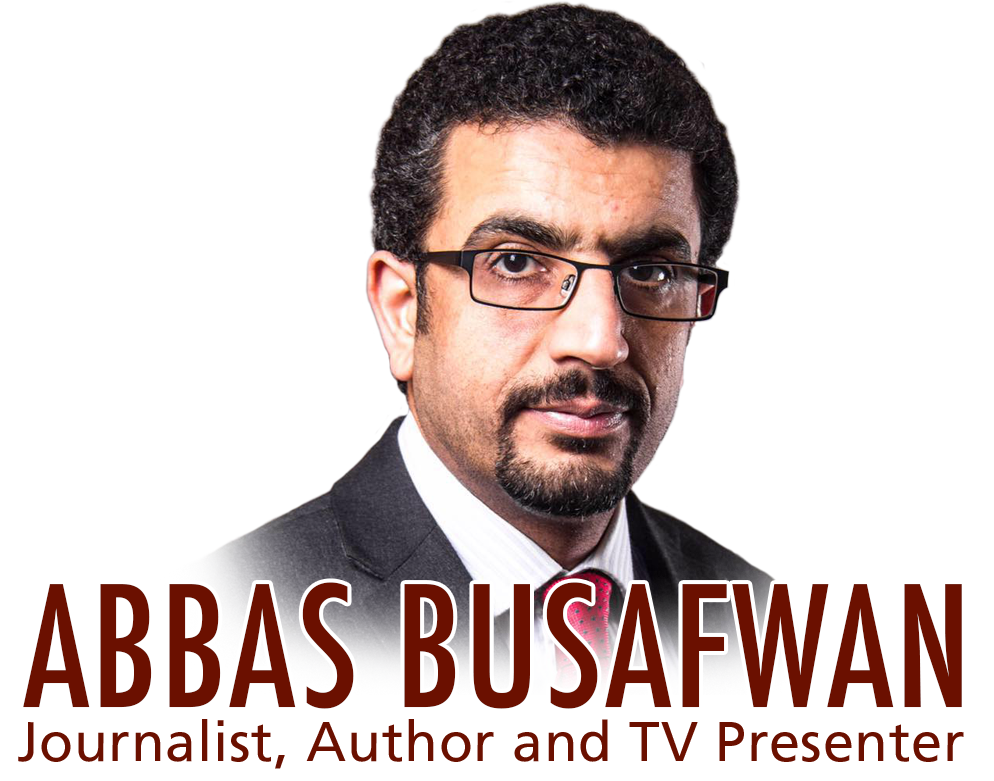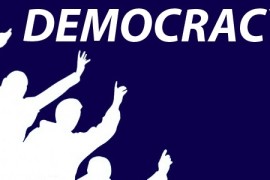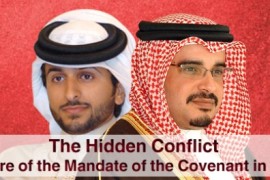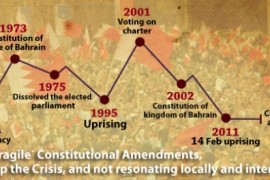- The fall of masks: Two years on the Saudi military presence in Bahrain
- 1-The fall of the Bahraini regime
- 2-‘Drowning’ in the security solution
- 3-Degradation of the honor of the military establishment in Bahrain
- 4-Emergence of internationalization problem and geopolitics node
- 5-Embarrassing the Arab Spring
- 6-Abuse to the ‘Gulf Union’ proposal
- 7-Gulf Interests are obstacles for the change in Bahrain
- 8-The truth of Saudi Arabia
- 9-The solution is internal and away from regional hubs
 The dual Saudi-Emirate intervention in Bahrain, under the cover of the Peninsula Shield, since mid-March 2011, has caused a real shock in the Gulf and in the region and perhaps has cemented convictions and fallen others. The questions are still continued addressing the causes and consequences of this unprecedented action post the independence era of Gulf “sheikhdoms”. Here what is believed to a number of issues highlighted as a result of this military presence, which is now entering its third year.
The dual Saudi-Emirate intervention in Bahrain, under the cover of the Peninsula Shield, since mid-March 2011, has caused a real shock in the Gulf and in the region and perhaps has cemented convictions and fallen others. The questions are still continued addressing the causes and consequences of this unprecedented action post the independence era of Gulf “sheikhdoms”. Here what is believed to a number of issues highlighted as a result of this military presence, which is now entering its third year.
1- The fall of the Bahraini regime
The entry of Saudi & UAE military troops to Manama, in broad daylight, on the 14th of March 2011, had given a clear indication that the Bahraini regime has fallen, from the political point in one way or another, and has no longer able to cope with the thousands who gathered at the Pearl Roundabout, chanting “the people want to bring down the regime”, and “Down Hamad,” the king of Bahrain since 1999.
From different perspectives, the marching of more than half of the people in the squares and streets, for nearly a month, demanding change of the structure of the existing regime, can only be considered as the biggest ‘scratching’ in the legitimacy of the regime, and greater than a setback to the ruling royal family, and perhaps not exaggeration to say that the ongoing rallies had withdrawn the popular side and the main pillars of the regime’s legitimacy.
The ruling regime is based now on the legitimacy of absolute power, having committed one of the biggest historic mistakes, while rise above on the demotic legitimacy, and daring to cancel the 1973 constitution in February 2002, i.e. about ten years ago prior to the start of Bahraini spring (14 February 2011).
On the other hand, the arrival of Saudi military tanks to Manama does not only mean that Al Khalifa regime in Bahrain is unable, from military point view, this time to use its soldiers in order to curb the massive protests, which started a month before the Saudi intervention.
The sense that something happened, and it was the revolution of February 14, 2011 and its aftermath, the security and Bahraini army has become cuffed and ineffective, after they exhausted their excessive and immoral power on February 16, 2011, when the army demolished the protesters in the Pearl Roundabout, which led to many death and hundreds of wounded, followed by unexpected rise in the protest movement.
The military force had relatively been restricted, between mid February and March 2011, and was subsequently enacted, following extended moral and political ammunition after Saudi intervention, in the form of the Peninsula Shield forces, which their guns supposed to be intended for external aggressor.
The continued GCC military intervention, ultimately aims to protect Al Khalifa regime from falling, through the formation of political and military cover to suppress the demonstrators, and to participate in this repression, whenever the need arise. Perhaps the best that describe it is the international news agencies, which said explicitly that the GCC intervention came to support the ruling family in front of an unprecedented flood of popular, a model that derived from the revolutions of Tunisia and Egypt.
2- ‘Drowning’ in the security solution
The Saudi military intervention decided on regime’ options in Bahrain. It is completely bounded, and continued, towards military approach (or what might be called the Saudi approach) without hesitation or slowdown.
During February and March 2011, important talks were held between the opposition political societies and the Crown Prince of Bahrain Shaikh Salman bin Hamad Al Khalifa. It was interesting that the seven points announced by the Crown Prince were a few hours before Saudi intervention, included important features to some foundations of constitutional monarchies, such as the elected government, and the elected parliament with full powers. It was prudent to point out that the former official senior State Department Jeffrey Feltman, had expressed his support for the process of dialogue and the positive initiative of the Crown Prince. Saudi intervention, however, buried the political solution, and caused deep depressions in the structure of the national situation, and inflicted horrific abuses in human rights record, some were recorded in the famous BICI report (so called Bassiouni Report).
The Saudi approach has plunged the country into excruciating, it does not seem easy to get out of it. Many had wished if Saudi Arabia intervened in Bahrain, similar to Gulf intervention in Sana’a. It’s true that they distorted the Yemeni revolution, but they have encouraged dialogue, instead of blood shedding, which is commendable point, the opposite of what they did in Syria.
3- Degradation of the honor of the military establishment in Bahrain
The increase of the Saudi military intervention in Bahrain has raised the importance of the question about the role of the Bahraini military official of the spring of Feb 14.
The question about the position of the armies and security and intelligence agencies, and their overall role in public life, has put firmly in the other countries of the Arab Spring: Tunisia, Egypt, Syria, Yemen and Libya. The assumption that deserves to be focused on is that the positions of the military establishment seem decisive in the course of revolutions. In the countries that the military sided with the revolution as in Tunisia and Cairo, the matter ended up quickly to the fall of the head of state, while in Yemen, whereby the army split between ousted president Ali Abdullah Saleh and the rebels, a ‘foggy’ participatory formula has been reached, and a transition that might not ended! All of this sheds more light on the military establishment in Bahrain, and its composition, ideology, whether it is with or against or neutral about the demand for democratic transformation in Manama, and why.
It turns out that the Bahraini army, and security forces of the Ministry of Interior, composed of elements of the mercenaries from Pakistan, Yemen, Syria and Jordan in addition to Westerners and Arabs security experts, and that Bahrain’s Shiites, who make up the majority of the population, are not represented in the military, and that the doctrine established for this institution is to defend Al Khalifa governance, and in case of referring to defend the honor of the nation, it is the term identifies and refers to the ruling Al Khalifa clan.
The army and the general military establishment in Bahrain are involved in abuses against pro-democracy, therefore, of the most important recommendations of the BICI report (Bassiouni report) is the restructuring of the military, but that apparently is not on the agenda of the ruling family and its regional supporters, who believes in the option of using force, and considers the dialogue tool is just a tool to assist in that direction.
After the Saudi military intervention, the military establishment lost a large part of its honor, once because it needed a bond from abroad to kill citizens, and before that the establishment itself killed citizens which was documented, but originally was found to be popularly frowned and there is no national consensus as long as it is based on composition of strange mercenaries.
4- Emergence of internationalization problem and geopolitics node
This title has emerged clearly after the entry of Gulf military convoys in Manama, carrying signals victory! In fact the official Bahraini talk about the rejection of interference by outsiders seem to be like a shallow cliché as long as the Saudi army is on the ground of Bahrain, which opens doors for other interventions, most notably the Iranian sound, who has been supportive of the Bahrain revolution, but it also has shown carefulness in going beyond media and political support.
The positions of the west and east have indicated that the Bahraini event has become a non-local dimensions. However, it is clearly noticed that the revolution of Bahrain was the only one that was not discussed at the United Nations, which traded other Arab revolutions, and still. This, however, has not hid the issue of the internationalization of the Bahraini revolution, and perhaps has bonded the nature of the existing alliances that operate against the demands of the rebelling and their right to elect their government and its Board of Deputies.
However, 44 countries condemned Bahrain in the Human Rights Council in early March 2013, while only 27 countries had condemned Manama in May 2012 because of its failure to implement the recommendations of the Bassiouni report. This reflects that confidence in the promises of the Bahraini authorities are almost nonexistent internationally, despite that the international consensus supports the existing dictatorship.
Likely that the issue of internationalization and node Gulf and rational geopolitics are not operated against the authorities to the extent that aspire those who are eager for democracy in Bahrain and in the region.
Even the equation of Iran/Iraq and the eastern region in Saudi Arabia, which are areas indeed perceived as supportive for the revolutionaries of Bahrain, is being exploited, regionally and internationally that hurts the revolution of Bahrain and aiming to blockade it, for reasons that are related to what is said about securing oil supplies and the protection of Israel and encircling Iran, under a western pre-premise that a democratic transition in Bahrain may be in Iran’s favor, as the Iraqi experience shows.
This is continued even that Bassiouni report has denied an Iranian involvement in Bahrain, and has emphasized on its internal nature. Not also to forget the remarks and reports from western countries – as well as Wiki Leaks – that confirm that the crisis in Bahrain is a result of Al Khalifa monopoly of political and national wealth resolution, and that there is no ‘hand’ of Iran in all Bahraini popular uprisings that have been extended for decades.
However, Bahraini revolution still paying blood, tears and discrimination and the violations continue for reasons that given the regional and internationalization direction proceed in a counter-revolution to the rights of the people to decide for themselves the pattern of their rule.
5- Embarrassing the Arab Spring
It is difficult to find a fundamental difference of Bahrain’s democratic demand between the position of the Egyptian regime and Al-Azhar during Hosni Mubarak period, and the position of the new Egyptian regime, as it is also difficult to find a meaningful difference between the position of Tunisia before and after the its revolution.
Thus, while the Arab peoples hope that the new regimes created after the revolutions would reflect their say towards other revolutions, they seem to only be concerned with pleasing the dictators as was the case before the Arab Spring. I there a bigger failure that harms the credibility of these new regimes than that: to do the opposite of what they used to say!
If you look deeper, it seems surprising, for example, not to find a difference between the position of the ruling Fatah movement in the West Bank, and between the ruling Hamas in Gaza, and perhaps Hamas attack on Iran and Hezbollah is overwhelming in that, while the Palestinian National Authority does not seem concerned so much about what’s being said of Iran’s support for Bahrain activists, or at least not too or overly framed as do close to Hamas.
Whereas position of The Arab League is unchanged from three decades, and when reviewing its reports and statements during the Bahraini uprising in the nineties, and its current statements you hardly find any changes i.e. condemning what it so called popular terrorism, and external support for mobility, which is a position that is clearly against the people of Bahrain and their fair demands.
6- Abuse to the ‘Gulf Union’ proposal
The ‘Gulf Union’ has been put forward at the peak of the repression in Manama, backed officially by the Gulf countries. The union seemed timely as a harsh wave in response to the demand of democracy spreading by the Arab Spring, which encouraged people in the Gulf to show their eagerness for democracy, in Kuwait, Oman, and also in the UAE and Qatar, and without a doubt in Saudi Arabia.
No one from the peoples of the Gulf, in general, opposed to strengthening GCC relations, towards reaching federal patterns, and perhaps the people are more enthusiastic for this union, which is not supportive by the regimens and possibly opposing it. Thus, it is not surprising to know that the talk about the GCC union has almost stopped with the mistaken belief that the security situation is under control in Bahrain.
A great disservice was done to the Gulf union proposal after the Gulf soldiers were accused of killing other people from the Gulf simply for expressing their opinions; as if the Gulf authorities say clearly, and in full mouth, that the option of a ‘security union’ is on the table if the public pressure from the people in the Gulf increases on the ruling authorities.
However, the Bahraini situation looks interesting, in terms of two things: an undisciplined official rush toward what might be called the handover of Bahrain to Saudi Arabia, added to another serious matter, which is the naturalization of foreigners and mercenaries that prejudices the configuration of the Shiite-majority population.
It is true that the dictatorship gives, voluntarily, its decision to others, which Al Khalifa used to do, but it is not usual for the dictatorship to ‘give out’ the entire country to others, whatever its proximity to Arabism and Islam.
These (selling the land and naturalization) appear to be two anomalous types by the dictatorships against their people and their homelands.
In the end, it seemed that the Gulf Union proposal as a warning to all people in the Gulf that are dreaming of democracy. The options: either existing dictatorship or a security union against the people.
7- Gulf Interests are obstacles for the change in Bahrain
The Gulf intervention in Bahrain has showed that the regional situation has a significant impact on the nature of governance in Bahrain, and that the mass internal movement may not be able to change the status quo as happened in Tunisia, for example, without taking into account the interests of the ruling families in the Gulf.
The Gulf has supported Bahrain via military troops and materiel, and politically at all levels, and economically with ten billion dollars, and perhaps the concerns are valid, that the ‘Gulf Marshal’ support is a substitute for the political and economic reform.
The regional dimension, the Gulf in particular, seems to be overwhelming in the Bahraini political path and its future. So, it seems wrong to believe that the revolution of Bahrain is facing Al Khalifa, it faces all the ruling families in the Gulf, thinking of these families that the ‘infection of freedoms’ from a democratic Bahrain may be transferred to its gulf neighboring countries, and may also be a platform to support democracy in this conservative neighborhood.
8- The truth of Saudi Arabia
The emerging reality now is that the presence of Saudi soldiers in Bahrain for more than two years, appears clearly that Saudi Arabia, not Iran or other external force has a hand in Manama.
This geopolitical fact is evident to Iran and the West, even clearer than among some of the opposition parties.
For me, I have written about possible scenarios for a settlement in Bahrain, which I see it coming soon, and I think such settlement is fragile and not historic, perhaps similar to the settlement of the Oslo for Palestinian – that I referred to it in a series of articles under theme “Bahrain 2014″ published in Al-Akhbar Lebanese newspaper. There are no foreseen evidences in my possession that make me believe that Bahrain will emerge from the Saudi influence in any future settlement.
That is what makes eminent opponents talking about the change in Saudi Arabia as an initial entrance to accomplish a substantial reform in Bahrain, this may be true, but I do not encourage believing in this hypothesis, because it means that Bahrain has to wait for so long to accomplish its democracy.
Perhaps Bahrain for Saudi Arabia is as Lebanon for Syria, regardless of any matters related to the nature of the regimes and alliances, and so the Saudi presence in Bahrain is in many respects similar to what was Syria’s presence in Lebanon. Whether the Saudi presence in Manama is called an occupation or not, it is without doubt takes out Bahrain’s political sense, and without a doubt it prejudices to the sovereignty of the Kingdom of Bahrain, and its national confiscated resolution.
The question is: Is it possible for Bahrain to be Lebanon of the Gulf, and not Hong Kong to China, because that may be understood as of one country with two regimens, which I do not think as Bahrain is an independent state, and its independence cannot be comprised under any circumstances.
When I am saying that Bahrain is the Lebanon of the Gulf, I do not mean turning it into an arena of influence and regional conflict, but I meant democratic quotas (consensual in a positive sense) in the center of Arab dictatorships – an idea that is still entrenched.
It is, in no doubt, an imperfect invitation that does not satisfy many who looks for a classical democratic based on majority, which may be far-fetched according to the current balances, but we have to warn that if there were Western-style democracy in Bahrain, then a Bahraini ‘Zarqawi’ will be the master of the scene the next day to form a governmental of popular majority!
9- The solution is internal and away from regional hubs
The Bahraini spring dropped several parties in profound contradictions, and showed their hypocrisy, and not commitments to their statements. This applies to the states of the Arab Spring, political Islam, the West, the United Nations and the Peninsula Shield, and also the Arab media, most of it of belong to the Gulf, which dealt with the uprising in Bahrain as an event that does not deserve to be given a chance for analysis.
As for Saudi Arabia, it is the problem for Bahrain and its dilemma, and unfortunately not part of the solution, under a strict of Saudi doctrine: owned or burned Bahrain. A belief that was implemented by Riyadh in Iraq, and carried out in Syria, and thus Riyadh loses, Bahrain and the regional security.
The biggest mistake committed by the Bahraini authorities is throwing all of “their leaves in the basket of Saudi Arabia”, which reminds me of throwing Kuwait all its leaves in Saddam Hussein’s basket, who finished Kuwait off the next day once the war with Iran was over. Currently, Kuwait is trying to create a balance between the Iran, Iraq, and Saudi Arabia, and so perhaps should ‘new’ Bahrain does, so that the destiny of the small countries is “to lay their eggs in the basket of their people first”, and then distributed among the outside aspirants, at that basically saves it.




